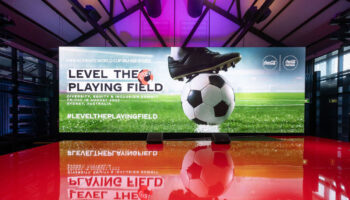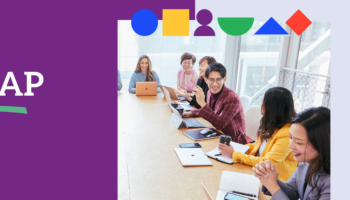The following skills are essential to quickly filtering through the endless universes of information, choices, and distractions that now lay before us in a digital and global world.
- Mindfulness — the awareness of CONTEXT and of changes within that context (patterns, themes, connections, predictions).
- Discernment — the ability to recognize and anticipate the consequences of the patterns around you — and to know WHAT TO DO as a result.
- Action — the common and outdated view that beliefs determine behavior is wrong — rather, it is your behavior that shapes your beliefs, personality, and identity. Having a bias for action and immediate implementation is how rapid learning occurs. Experiential learning is far more powerful than gathering information. Experience is emotional — and emotion, not rationality, is what changes mindsets and behaviors.
- Expectancy — according to the “Expectancy Theory of Motivation,” three things must occur for a person to have high motivation for achieving their goals. You must believe you can do what it takes to achieve your goal. You must believe that you know how to achieve it (you have the proper methods). Finally, you must believe that the rewards of the particular goal are personally meaningful. Another word for expectancy is faith — the belief in your ability to seize or create a future outcome.
- Feedback — failure is feedback. You shouldn’t and can’t avoid feedback if you want to learn. When you have “transformational learning experiences,” your worldview is disrupted. You replace old ways of seeing with new and better ways. The faster and more consequential the feedback you get, the more in flow you will be.
- Adaptability — according to Charles Darwin, it’s not the smartest or the strongest that survive, but the most adaptable to change. Most people believe that children are more adaptive than adults. Children, after all, can learn multiple languages at one time, if given the opportunity. Adults seem to become more rigid and less adaptive. Or so the thinking goes. The truth — children have more to adapt to. They’re required to learn and figure stuff out in order to survive in society. As you grow older, you have less to learn in order to survive in society and to meet the expectations of the norms around you. Yet, if you were to continually put yourself into higher and more demanding situations, you could adapt. You could adapt faster, actually, than children, because you already have so many deep and powerful connections made. The key, is being willing to let go of the models which are no longer effective at the higher stages of adaptability. If you want to adjust to new norms, you’ll have to adapt to them. And you can.
The remainder of this article is a brief dive into how to master these six keystone skills.
The “keystone” is the center stone in an arch which holds the rest of the structure together. Without the keystone, everything falls apart. In the book, THE POWER OF HABIT, author Charles Duhigg explains that “keystone habits” lead to the development of multiple good habits. They start a chain effect in your life that produces a number of positive outcomes.
Keystone skills, similarly, are those half dozen skills which facilitate the development of other skills. They are foundational to living a life in alignment, to having confidence and clarity, and to becoming a powerful learner and leader.
If you develop these six skills to mastery, there is little you won’t be able to do and become in your life.
- You’ll be able to quickly discover the signal in the massive sea of noise.
- You’ll make powerful, intuitive, and quick decisions.
- You’ll take immediate action on the most important and relevant information.
- You’ll expect the best outcomes to occur — which will create self-fulfilling prophecies.
- You’ll get immediate and consequential feedback to what you’re doing — which will keep you humble and engaged.
- You’ll adapt immediately based on the feedback you get, which will keep you adjusting and improving what you’re doing and how you’re doing it.
How To Develop Mindfulness
“The hefty price for accepting information uncritically is that we go through life unaware that what we’ve accepted as impossible may in fact be quite possible.” — Ellen Langer
In her important book, MINDFULNESS, Harvard psychologist, Ellen Langer, explains that mindfulness has two components:
- Awareness of context — of what is around you
- Awareness of change within your context — patterns, changes, connections, predictions
In our individualistic culture, we have a hard time being mindful. We have a hard time recognizing the power of surroundings and situations.
This is a big problem because we, as people, are shaped by what is outside of us. We like to believe we are the masters of our fate. But our situation and environment are far more powerful. As Dr. Mashall Goldsmith has said, “If we do not create and control our environment, our environment creates and controls us.”
Once this realization takes hold, you become far more aware of what (and WHO) is around you.
You become more sensitive to the energetic effects of people, places, and things. This heightened sensitivity is mindfulness. Because not only do you notice how your surroundings influence your body, mind, and emotions — but you notice shifts in your surroundings. Not just from one situation to another, but the broader world as a whole.
You notice patterns and changes in society and how most people operate. You see things before most people do, because as Ellen Langer explains, most people mindlessly and reactively walk through life.
They are unaware just how much their environment is shaping them. They are unconsciously becoming something they wouldn’t want to be.
Thus, the benefits of mindfulness are:
- You can make powerful decisions about outside influences that shape your behavior and identity
- You can predict where you as a person, and society as a whole, is going
How To Develop Discernment
“Being quick to observe is an antecedent to and is linked with the spiritual gift of discernment. And for you and for me, discernment is a light of protection and direction in a world that grows increasingly dark.” — David Bednar
Being mindful is all about OBSERVING what is around you. It’s about noticing subtle cues, and about thinking critically about what you’re noticing.
Discernment means you’re aware of the IMPLICATIONS of what you’re observing. It means you can PREDICT where certain behaviors, actions, ideas, and environments will take you.
When you development discernment, you can make powerful choices, because you have both information and intuition. You can’t have discernment without first observing and paying attention.
This will require you to become a very, very good listener. To pay attention to what you’re hearing and what you’re seeing. To become a student of life.
Intelligence is the proper application of information and knowledge. Most people are not intelligent because they don’t apply what they learn. They aren’t hyper-critical about what they let influence them. They haven’t developed a framework and set of values for determining what is a waste of time and what isn’t.
Your discernment for people, information, choices, and consequences will continue to develop as you enhance your standards for yourself. Your life is a product of your standards. You get in life what you’re willing to tolerate.
According to the famed Peter Drucker:
“In a few hundred years, when the history of our time will be written from a long-term perspective, it is likely that the most important event historians will see is not technology, not the Internet, not e-commerce. It is an unprecedented change in the human condition. For the first time — literally — substantial and rapidly growing numbers of people have choices. For the first time, they will have to manage themselves. And society is totally unprepared for it.”
People aren’t prepared for the world we now live in because people haven’t developed mindfulness and discernment. As a result, they experience decision overload and decision fatigue — hence willpower is no longer a useful skillset in today’s world. Instead, you need to mindfully create your environment. You need to make one decision that eliminates a thousand decisions. You need to continually hold yourself and those around you to a higher standard.
How To Take Positive Action
“A mind that is stretched by a new experience can never go back to its old dimensions.” — Oliver Wendell Holmes, Jr.
Dallin Oaks once said, “We should be careful not to exhaust our available time on things that are merely good and leave little time for that which is better or best.” Your life and who you become is entirely shaped by the quality of your decision making.
- Your behavior shapes your identity and personality. You are what you DO.
- If you have five minutes, how are you going to use that time?
- If you have two hours, how are you going to use that time?
- If you have five books to choose from, which book will you choose?
- If you have five friends who you will become the average of, which five friends will you choose?
Your answer to everyone one of those questions determines the person you will become, the life you will live, the happiness you have, etc.
If you aren’t mindful and discerning, you won’t make powerful decisions. However, it all starts with one simple decision to act powerfully. According to research by Stanford psychologist, BJ FOGG, small wins create enormous ripples of confidence.
Confidence is a byproduct of positive action.
Inspiration and creativity are byproducts of positive action.
Your beliefs indeed influence your behavior. However, your behavior far more profoundly influences your beliefs. When you behave a certain way, your beliefs about that thing change.
If you start making even small progress toward a goal, you’ll begin to believe you can make more progress. If you act poorly, your beliefs about yourself will become negative.
Your personality isn’t what shapes your behavior. Instead, your behavior shapes your personality.
Personality is a byproduct of choice — although for most people that choosing was made unconsciously, reactively, and mindlessly. Most people are the negative product of an undisciplined and unintentionally-designed environment.
Your personality is the momentum and pattern of prior decisions. Although it may seem like “you,” it is not. Only the present and past version of you. If you change your behaviors and environment, you will change yourself.
As you become more mindful and discerning by making positive actions, your beliefs, behaviors, and personality will change.
You absolutely can get to the point where you proactively and consciously transform yourself. You can go from introvert to extrovert. From shy to incredibly articulate. From dull to creative.
Do most people make such profound change? Of course not. They’re not required to. They’re not demanded to. They don’t expect to. They don’t feel the fear and do it anyways. They don’t create powerfully emotional experiences that disrupt their core — allowing them to see and act differently than was their past.
Learning can be defined as making a PERMANENT change in your cognition and or behavior. It’s not LEARNING if it doesn’t lead to a change in how you see and live in the world. Gather information is not learning. Doing the same thing over and over and over isn’t learning. You must have emotional and transformational experiences that change how you operate and see the world. You must grow in understanding and INTELLIGENCE.
How To Develop Profound Expectancy
“You cannot expect to achieve new goals or move beyond your present circumstances unless you change.” — Les Brown
According to psychology’s Hope Theory, hope reflects your perceptions regarding your capacity to:
- clearly conceptualize goals
- develop the specific strategies to reach those goals (i.e., pathways thinking)
- initiate and sustain the motivation for using those strategies (i.e., agency thinking)
Ideas are cheap. Creating plans and executing those plans is rare.
Very few people implement what they learn. You can read hundreds of books, attend seminars, and get expensive coaching — but none of that will matter if you don’t put any of the ideas into practice.
We live in an information world. People’s heads are full of information. It’s never been easier to access. Yet, few people’s lives make dramatic transformation because few people discern which information is crucial, develop plans for executing that information, and immediately applying that 80/20.
As you begin acting toward your goals and getting small wins, your confidence will increase. You can’t have confidence without positive and goal-consistent behavior.
Eventually, and rather quickly, you can develop “expectancy” that your goals will happen. This “expectancy” can become a resolve and deep commitment — where you know before the fact that what you want, you will get. Napoleon Hill explained it this way: Whatever the mind can conceive and believe, the mind can achieve.
Knowing something and BELIEVING it are two very different things. Believing in something takes a willingness of the heart.
Many people know what they should do, but they don’t believe it enough to actually do it. They don’t truly believe in themselves and their ability to change. Their lack of belief stops them from taking the needed actions to create that change. Instead, they become cynical or justifying.
How To Set Your Life Up For Immediate And Consequential Feedback
“This automatic feedback is another reason extreme athletes have found flow so frequently, but what if we’re interested in pulling this trigger without help from the laws of physics? No mystery here. Tighten feedback loops. Put mechanisms in place so attention doesn’t have to wander. Ask for more input. How much input? Well, forget quarterly reviews. Think daily reviews. Studies have found that in professions with less direct feedback loops — stock analysis, psychiatry, and medicine — even the best get worse over time.” — Steven Kotler
Feedback is how you change your mind. Feedback is how you change your behavior. Feedback is how you get into flow.
The more your life provides immediate feedback for your behavior, the faster you’ll learn. If your behavior isn’t consequential, you’ll continue negative patterns.
When you take bold actions, you get feedback much quicker. For example, when you share your goals publicly, you get different feedback from when you keep them private. When you invest a large percentage of your money into your values and goals, you’re far more accountable to those goals. Failure means a lot more.
Necessity is the mother of invention. The more your environment and situation demands you to perform, the more you’ll rise to the occasion. Psychologists call this the “pygmalion effect.”
It’s your responsibility to create an environment that demands you to show up. All you have to do is start acting. Start being more honest. Start seeking more responsibility. Start being more proactive. Powerful actions change situations. Powerful action changes relationships. Powerful action changes your trajectory.
How To Become Adaptive And Fluid
“If something is presented as an accepted truth, alternative ways of thinking do not even come up for consideration.” — Ellen Langer
Children are adaptive because they have to be. They haven’t developed habits of avoiding change. They seek learning and understanding. They are constantly getting feedback from the world around them.
Yet, adults eventually stop adapting as much. Instead, they over-adapt to the environment around them. They stop putting themselves into situations that force them to change. This reflects a lack of mindfulness, action, and confidence.
Once you’ve developed confidence in your ability to learn and adapt — in your ability to mindfully mine and discern new situations and environments — you’ll be far more willing to jump into new and demanding situations. You’ll be willing to fail and be humbled. You’ll seek more feedback.
You’ll act. Because as you act in new a profound ways, you’ll quickly adapt to your new situation and it will become your “new normal.”
Viktor Frankl explained in MAN’S SEARCH FOR MEANING, “Yes, a person can get used to anything, just don’t ask us how.” You can get used to living in a concentration camp. You can get used to living far more powerfully. Whatever is required, you will learn and adapt. Yet, eventually life doesn’t require much but the status-quo for most.
As a super-learner, your job is to take immediate action, get feedback, and adjust to the feedback you get. When you stop adapting to new things, you stop learning. Over-adapting is the path to apathy and boredom.
Find that child inside of you and never stop learning. Kids learn to walk because they have to. They learn math and reading in societies where it’s required. They learn whatever the norms of their environment require them to learn. Once learned, they stop learning as much. Unless they continually change their environment and situation. Hence, when the student is ready, the teacher appears. When the student is truly ready, the teacher disappears.
Lessons are repeated until learned. Most people stop learning their lessons because their situation supports them in their current decision-making. They are justified in what they’re doing. They don’t mindfully see the patterns of their behavior and the behavior of those around them. They don’t develop discernment and immediate implementation. Their personality gets stuck and they thoughtlessly believe they can’t change — that who they are when they were born is who they must be when they die.
Conclusion
Have you developed these six skills?
- Mindfulness
- Discernment
- Action
- Expectancy
- Feedback
- Adaptability
The world is becoming increasingly intrusive. If you don’t learn these skills, you’ll be shaped by an environment that was created for you, not an environment that was created BY you.
If such is the case, you’ll stop developing and over-adapt. You’ll get stuck. But you don’t have to get stuck. You are fluid and adaptive. You’re actually more adaptive than children — if you choose to be. If you’re willing to purge and uproot old patterns and paradigms with new ones.
If you’re willing to change, you can change. But you can’t see yourself in isolation. You are part of the system around you. The change must be holistic.
Originally posted by Benjamin P. Hardy on Medium.com







